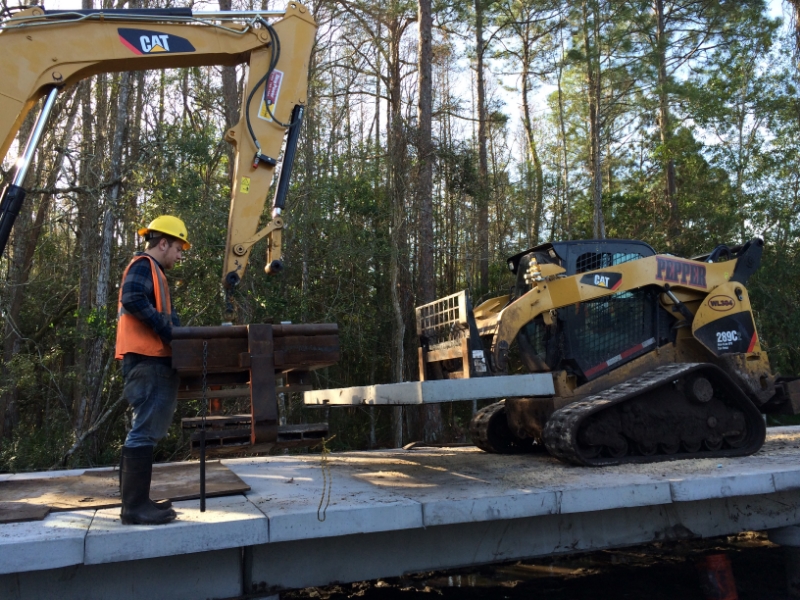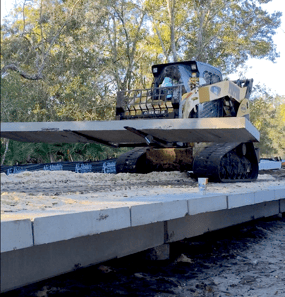PermaTrak® Top Down Boardwalk Construction

If you are working on a boardwalk or designing a pedestrian bridge through a sensitive preserve area, such as a wetland boardwalk, you may be asking yourself, "How can we simplify the permitting process? How can we provide access to a wetland area without harming the wetland itself?"
Both questions and their answers should be discussed in the concept phase of the design.
Wetlands can be protected during the construction phase by designing the boardwalk to be installed from above, otherwise known as “top down construction.”
Top Down Construction
Top down construction refers to the ability to install boardwalk treads and beams from equipment operating on top of previously installed treads and beams. With PermaTrak's concrete boardwalk system, this can often be accomplished without an engineer having to "bulk up" the boardwalk design to support a heavy piece of equipment.
With the right preparation between the designer, owner, and PermaTrak's engineering team, preferred construction methods can be determined during the concept or project design phase; boardwalk components can then be designed accordingly to support the construction equipment loads during installation.
Precast concrete's inherent strength and durability make it a naturally suitable material for top-down construction, without a significant difference in material price.
Top Down Concrete Boardwalk Construction
General Process
Small, efficient machines that lend themselves well to top down construction are readily available to installing contractors.
Attachments are added to the machines for the task of installing various types of deep foundations, such as timber piles or helical piling, both commonly used for wetland boardwalks.

Once the deep foundations are installed, often spaced at 10’ to 15’ apart, then the precast concrete longitudinal beams (PermaTrak system) or headers and stringers (traditional timber or composite boardwalk decking system) can be placed.
The precast concrete beams (PermaTrak system) or headers and stringers (timber boardwalk) are placed with the same machine that installs the foundation, often with some type of simple handling rigging or spreader bar attached. Following these load-bearing elements, the walking surface treads (PermaTrak system) are set with the same piece of equipment or planks are individually screwed down (timber boardwalk). A steady stream of boardwalk components is brought to the end of the structure as it is built, usually by a skid-steer type of implement.
See below for a quick video of PermaTrak top down boardwalk construction in Cary, NC. The concrete boardwalk treads that the contractor is moving into place are: 3' lay length (direction of travel), 5.5" thick and 15'-4'' in width.
 Timber or Composite Boardwalk Materials
Timber or Composite Boardwalk Materials
A timber or composite wood boardwalk can also be designed to support heavier equipment for top-down construction, but not without bigger and bulkier load bearing components (beams, headers, stringers, etc.). These extra steps typically result in a higher cost to the owner overall.
Permitting and Construction Footprint
Using the top down method of construction, permitting is usually simplified as it reduces the footprint of the wetland boardwalk during the construction phase. In most cases, the construction footprint is reduced and the wetlands will remain healthier.
Further Information
For more information on top down construction, please see the following related resources:



